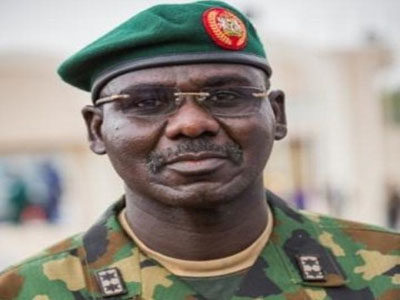
A colossal failure of intelligence is to blame for last December’s massacre of at least 347 members of a Shi’a Muslim group in Zaria, a judicial commission of inquiry into the killings says in its report.
The commission, set up by the Kaduna State government, said the Nigerian Army, Police and the State Security Services, failed in their responsibilities, thereby allowing the killings by the army to occur.
The Shi’a Islamic Movement said it lost more than a thousand members in the attack that took place between December 12 and 14 at its headquarters.
The judicial panel said it could confirm 349 deaths – including a soldier. It said that military officials refused to cooperate with investigators, hindering the panel’s ability to know the exact number of deaths.
The army claimed it killed only seven Shiites for blocking a public road and attempting to assassinate its chief, Tukur Buratai, a lieutenant general.
The report did not blame Mr. Buratai for the deaths. It indicted the General Officer Commanding the Nigerian Army 1st Division in Kaduna, Adeniyi Oyebade, a major general, and A.K. Ibraheem, a colonel, who led the operation.
It also recommended the trial of officers who partook in the killings and criticised the security agencies for choosing brute force over basic intelligence in responding to civil unrest.
The report was submitted to Governor Nasir el-Rufai on Friday, but its details are not public yet. PREMIUM TIMES obtained the report exclusively.
The 13-man panel, led by Mohammed Garba, a judge at the Federal Court of Appeal, Port Harcourt, said the Nigerian Army and security agencies have intelligence capabilities but failed to put them to use.
“The clash between the Nigerian Army and the IMN from 12-14 December, 2015, reveals a glaring failure of intelligence. The SSS, the NPF as well as the Nigerian Army all have intelligence functions in their mandates.
“The Nigerian Army failed to by all indications gather sufficient intelligence that could have been used to follow another route for example, thereby avoiding the clash,” the panel said.
The commission condemned the sloppy attitude of security agencies towards their job, saying they might have allowed themselves to be infiltrated by the IMN when the reverse should have been the case.
“This inadequacy and the reluctance of these agencies to provide vital information requested raise concern on how well they are doing their work.
”There is also an allegation that has made the rounds that it is the IMN members that have infiltrated the security agencies of the country rather than the order way round. This is indeed a very worrying situation,” the commission said.
The commission lambasted Nigeria Police for their role in the bloodbath.
“While the NPF was present at the beginning of the clash, they explained to the commission that they took the decision to withdraw from the scene and go and defend their police stations, suggesting thereby that they had no responsibility for law enforcement at the scene of the clash.
“The 1999 Constitution task police to for detection and prevention of crime and apprehension of offenders.”
While the report did not blame the federal government for any role in the killing, or its response after, it criticised the government for failing to take “proactive measures” against “seemingly dangerous groups and organisations” by failing to implement previous reports.
“Testimonies of witnesses and stakeholders who appeared before the commission point to reasonable conclusions that there was a lack of political will on the part of the federal government to take proactive action against seemingly dangerous groups and organisations.
“Many witnesses pointed to the non-implementation of recommendations of reports of previous commissions of inquiry relating to this group and others who have posed grave threats to peace and harmonious living. Of particular relevance have been the reports of Galtimari and Sheikh Lemu Presidential commissions pertaining to Boko Haram insurgency.
Amongst 33 recommendations, the commission advised the Kaduna State Government and the federal government to take intelligence gathering serious, facilitate training and equipment for security agencies and ensure that Islamic groups like the IMN are placed under regular surveillance.
END

Be the first to comment